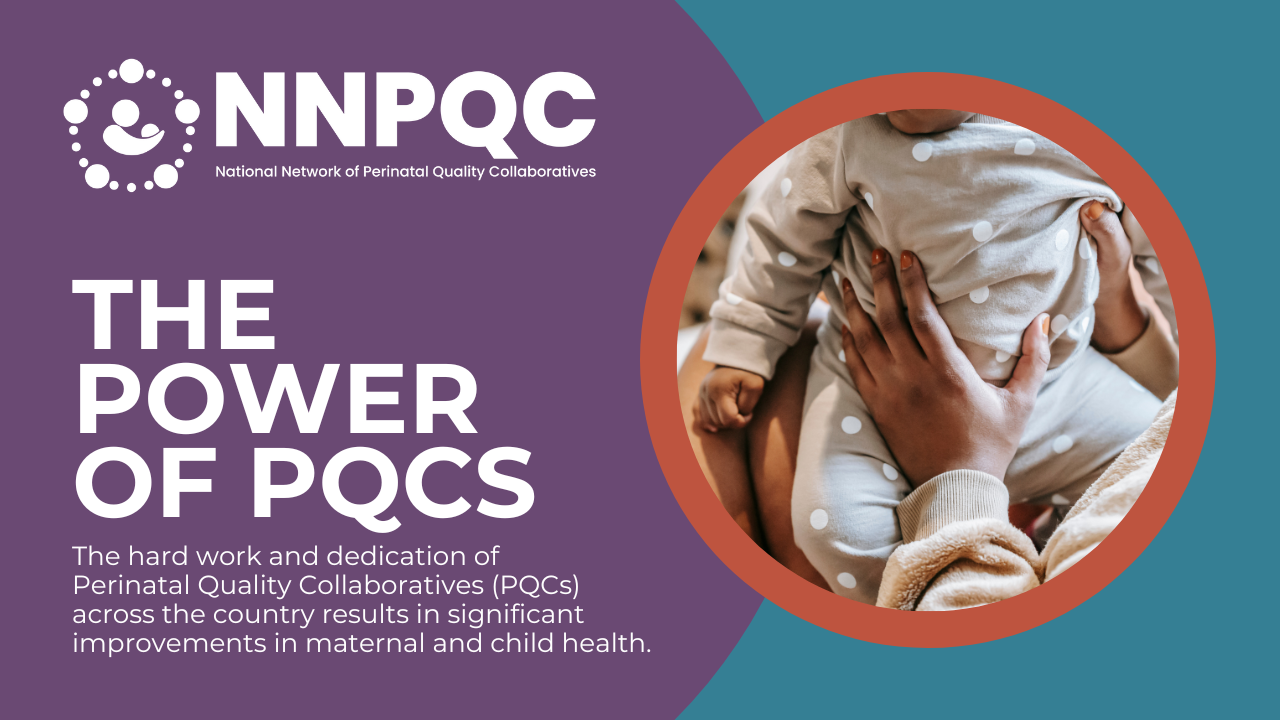National Network of Perinatal Quality Collaboratives
Providing resources and support toward efforts to improve maternal and infant health outcomes


What is a PQC?
Perinatal Quality Collaboratives (PQCs) are state or multi-state networks of multidisciplinary teams, working to improve maternal and infant health outcomes.
PQCs accomplish this by advancing evidence-informed clinical practices and processes using quality improvement (QI) principles to address gaps in care. PQCs partner with hospitals, providers, nurses, patients and families, and other stakeholders using a process of data-driven, continuous QI to spread best practices, reduce care variation, and optimize resources. The goal of a PQC is to make measurable improvements in population-level outcomes in maternal and infant health and achieve systems-level change.
PQCs current areas of focus include:
IMPACT STATEMENT
The Power of PQCs
The hard work and dedication of PQCs across the United States has resulted in significant improvements in maternal and child health.
Watch this highlight reel of the NNPQC’s full Project Impact Statement video to learn about the impact of PQCs and their efforts.
Key PQC strategies include:
What PQCs are saying
“Hearing from other PQCs continues to help guide and push us to strive for better data collection, family engagement, and more. We have benefitted from attending other teams’ presentations and discussing how we can learn from their work.”
“NNPQC was extremely valuable in building our capacity to begin moving forward to improve PFP engagement to provide care to all GA mothers and babies.”
Laura Layne
“I loved listening to what other PQCs were doing for inspiration and validation of what we were working so hard towards achieving. I’ve made friends that I can call at any time and ask questions and ask for help. I know others know that of me, too.”
Kim Petrella
Map of State PQC Activities
Use the map to find more info on state PQCs by clicking on a state or one of the PQCs in the left column. Use the filter bar to see which PQCs are engaged in NNPQC activities this year.
States colored orange have received CDC funding for PQC activities in the current grant cycle.
Last updated February 2026. Please email [email protected] if you would like to request any updates to your PQC’s information.
Maternal mental health conditions, including suicide, are a leading cause of maternal mortality. The NNPQC, with the help of partner organizations, provides TA and support to PQCs in adopting the core AIM Perinatal Mental Health Bundle and corresponding improvement measures released in 2023.
The PQCs in the following states have prioritized addressing maternal mental health as of June 2025:
- Iowa Perinatal Quality Care Collaborative
- Kansas Perinatal Quality Collaborative
- Michigan Perinatal Quality Collaborative
- Minnesota Perinatal Quality Collaborative
- Missouri Perinatal Quality Collaborative
- Nebraska Perinatal Quality Improvement Collaborative
- New Hampshire Perinatal Quality Collaborative
- New Jersey Perinatal Quality Collaborative
- North Dakota Perinatal Quality Collaborative
- Ohio Perinatal Quality Collaborative
- Oklahoma Perinatal Quality Improvement Collaborative
- Perinatal-Neonatal Quality Improvement Network of Massachusetts
- South Dakota Perinatal Quality Collaborative
- Tennessee Initiative for Perinatal Quality Care
- Utah Women and Newborns Quality Collaborative
- Washington State Perinatal Collaborative
- West Virginia Perinatal Partnership
NNPQC Year 2 (2023-2024) Annual Assessment Key Findings Infographic
The Year 2 Annual Assessment fielded data from all 52 PQC’s activity during March 2023 to April 2024. In the infographic, you will find several key findings such as PQC demographics and facility participation, QI initiative data, and information on PQC’s data collection and utilization.
Thank you to all of the PQCs who completed the annual assessment!
To download the full version of the infographic, click the button below.
NNPQC By the Numbers
reduction in severe maternal morbidity from hemorrhage among Black women
(Louisiana PQC, 2018-2020)
reduction in length of stay for newborns
(Colorado PQC, 2017-2022)
increase in percent of opioid-exposed newborns who had a coordinated discharge plan
(Illinois PQC, 2018-2022)
reduction in NTSV cesarean rate compared to nation’s 1.5% reduction
(Florida PQC, 2017-2022)



